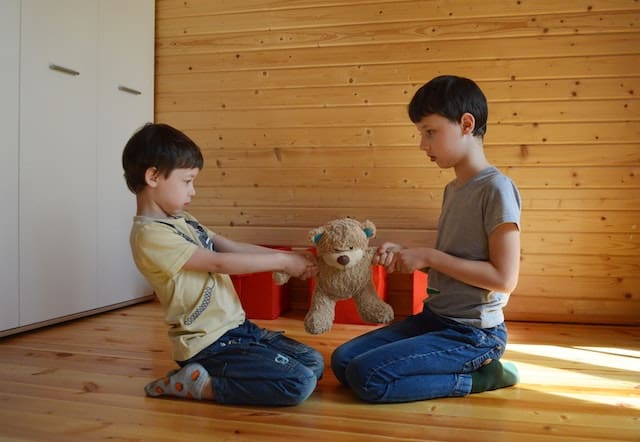
First published: 13 March 2023 @ 6:00 pm
As a parent, disciplining your child can be one of the most challenging aspects of raising them. The goal is to teach them right from wrong and instill values that will guide them through life.
With the right approach, discipline can be an effective tool to shape your child’s behavior and shape their character. However, it is essential to understand that disciplining your child requires a balance of firmness and empathy.
The key is to be consistent, fair, and effective in your approach. In this article, we will provide you with some tips on how to discipline your child in a way that is effective, respectful, and nurturing.
We will cover different strategies and techniques that you can use to handle challenging situations, including positive reinforcement, consequences, and setting boundaries.
We will also discuss the importance of communication, consistency, and modeling behavior, and how they can impact your child’s development.
Whether you’re a new parent or have been parenting for a while, we hope that this post will help you to give positive discipline to your child.
What Should You Do to Disciplining Your Child?
Disciplining a child is an essential part of parenting, but it can be challenging to know the best way to do it.
The AAP (American Academy of Pediatrics) suggests utilizing positive discipline techniques that instruct children on how to regulate their behavior, so parents can foster positive growth.
So, here are some discipline strategies for you as parents to teach your child in a good way.
1. Be Consistent with Your Expectations and Consequences
Disciplining children can be a challenging task that many parents face at some point in their child-rearing journey.
So, it’s important to establish a framework of expectations and consequences that will help teach kids about responsibility and accountability and to consistently apply that framework to ensure that they understand the consequences of their actions.
When enforcing discipline, it’s essential to provide ground rules, clear guidelines, and set expectations that are reasonable for your child’s age and level of development.
Be consistent in your use of consequences for positive and negative behaviors, and reward positive behavior while holding your child accountable for their actions.
This consistency will help your child learn from their mistakes, improve their sense of responsibility, and develop the skills and mindset needed to succeed in life.
It’s also important to communicate with your child about the reasons for the consequences they face and to provide explanations for how they can avoid similar situations in the future.
Therefore, the key to effective discipline is to be consistent with your expectations and consequences when enforcing rules and regulations with your child.
2. Use Positive Reinforcement and Praise for Good Behavior
When it comes to disciplining your child, using positive reinforcement and praise for good behavior can be an effective technique.
This approach focuses on encouraging desired behavior rather than punishing bad behavior. It involves praising your child for following rules, completing tasks, and exhibiting positive attitudes.
Praising your child for their good behavior can help to build their self-esteem and confidence while encouraging them to continue displaying positive actions.
Additionally, positive reinforcement can strengthen the parent-child bond by emphasizing good behavior and promoting positive communication.
It is important to be specific and genuine when delivering praise to your child, as they will respond best to specific feedback that recognizes their accomplishments.
By incorporating positive reinforcement and praise into your disciplinary approach, you can help your child develop positive habits and maintain a healthy parent-child relationship.
3. Avoid Physical Punishment and Focus on Natural Consequences
When it comes to disciplining your child, it is important to avoid physical punishment and focus on natural consequences.
According to the World Health Organization, around 60% of children aged 2–14 years regularly suffer physical punishment from their parents or other caregivers. Moreover, in some countries, almost all students report being physically punished by school staff.
This is of course a bad thing and inappropriate for children. Physical punishment is not only ineffective in bringing about long-term behavioral change, but it can also cause long-lasting harm to your child’s physical and emotional well-being.
Instead, try to focus on natural consequences, which are the result of a child’s behavior without any intervention from the parent.
These consequences can be used as a tool to teach your child responsibility and accountability for their actions, while also helping them understand the cause and effect of their behavior.
By avoiding physical punishment and focusing on natural consequences, you can promote a healthy and positive relationship with your child while helping them develop important life skills.
4. Communicate Clearly and Calmly with Your Child about Their Behavior
Effective communication is essential when it comes to disciplining your child. It is important to communicate clearly and calmly with your child about their behavior.
Clearly state what the problem is and what needs to change. Let your child know that their behavior is not acceptable and explain why. It is also important to listen to your child’s response and acknowledge their feelings.
Avoid yelling, threatening, or insulting your child as it can cause emotional harm and make the situation worse. Instead, maintain a calm tone and express your expectations in a respectful manner.
Consistent clear communication will help your child understand the importance of good behavior and avoid repeating negative behavior.
5. Set a Good Example for Your Child by Modeling Appropriate Behavior
One effective approach to disciplining your child is setting a good example through modeling appropriate behavior.
Children tend to pick up on their parents’ habits and behaviors, and what they see in adults can often shape their behavior for the future. Therefore, it’s essential that you be a role model for the behavior you want to see in your child.
For example, if you want your child to be respectful and polite, make sure you always use a respectful and polite tone when speaking to them and others. If you want them to be responsible, show them that you take responsibility for your own actions.
In short, you must lead by example, because your child will learn from you and emulate your behavior.
By modeling appropriate behavior, you not only help your child develop positive traits, but you also create a healthy and positive environment for them to grow up in.

Final Thoughts
Discipline is an essential factor in a child’s life that helps them become responsible adults.
As a parent, it’s essential to understand that disciplining your child isn’t about punishing or controlling them but rather teaching them valuable life skills.
When disciplining your child, keep in mind to be consistent, set clear boundaries and expectations, communicate effectively, and most importantly, show love and support.
With patience and perseverance, it’s possible to instill good behavior and character in your child that can lead to a bright and successful future.
Subscribe to our blog MatureParent for more information or tips about parenting and more!
FAQs
How do you discipline your child who doesn’t care about discipline?
Disciplining your child who doesn’t care about discipline can be challenging. Punishment may not work if it is not the right punishment for them. Parents should also understand why unwanted behavior occurred in the first place and find an appropriate solution that matches the reason for the behavior.
How do you calm an angry child?
One approach is to ask the child to tell you what happened and why they are so upset. This will help you better understand their feelings and help diffuse the anger. Additionally, try to provide some calm, factual information about the situation. This can help to reduce the child’s feelings of powerlessness and help them understand what they did wrong.
What to do if your child is attacking you?
If your child is physically attacking you, it is important to take action to protect yourself and your family. It is also important to understand why your child may be behaving aggressively. Kids may be aggressive towards parents for a number of reasons, such as feeling powerless or out of control.
How do you discipline a child that won’t listen?
There are ways to discipline a child who won’t listen, for example set clear rules and limits, be specific, or offer choices to make your child understand their inappropriate behavior.
How do you get your child to respect you?
Some tips that may help include being respectful when correcting your child and modeling respect in all your words and actions to your child.



